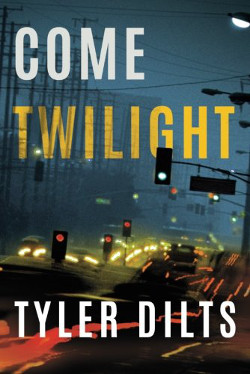 Come Twilight by Tyler Dilts is the 4th book in the Long Beach Homicide series, nominated for an Edgar Award for Best Paperback Original.
Come Twilight by Tyler Dilts is the 4th book in the Long Beach Homicide series, nominated for an Edgar Award for Best Paperback Original.
In the same way that Led Zeppelin birthed a legion of '80s hair bands belting out bad power ballads, Raymond Chandler shoulders responsibility for countless wisecracking detectives spouting dubious, cringe-inducing similes. So it’s always with more than a little trepidation that I begin any new procedural—such as Come Twilight, the 4th in Tyler Dilts’s Long Beach Homicide series—that features, well, a wisecracking detective.
It doesn’t take long (the second paragraph, in fact) to realize that Danny Beckett is not your typical hardboiled protagonist—unless, that is, you think Philip Marlowe was the type to binge-watch Downton Abbey, create Spotify playlists, or listen to podcasts. Beckett even has facility with social media. And if that’s not enough to distinguish him from your boilerplate gumshoe, get this: Beckett also has a sense of humor that isn’t just of the gallows variety. Don’t get me wrong, he’s not all puppies and rainbows—he’s still a cop after all. Beckett is grumpy, emotionally detached, and needs his alone time, but he’s not—refreshingly—a walking anachronism from the '50s.
So it was with relish that I sidled alongside Beckett in his investigation of the apparent suicide of a small apartment owner. He and his partner, Jennifer Tanaka, quickly find reason to suspect foul play. Their hunch is seemingly confirmed when someone sets off a bomb in Beckett’s car. Luckily nobody is hurt, but questions abound. Are the two crimes related? Was the bomb meant to kill Beckett or merely send a warning? If it was meant to kill him, why? If it was just a warning, what is Beckett being warned away from?
Unfortunately for Beckett, he is not allowed to formally answer any of these questions. Being the intended victim in the bombing disqualifies him from investigating that case, and since the car bomb might be related to the initial murder, he is taken off that investigation too. Unsurprisingly, these decisions do not sit well with Beckett, who is incapable of turning off his curious mind. As he explains:
Even after my first detective assignment, it still took years to understand that it wasn’t the answers that filled the void. No, they were never enough, they never provided enough knowledge or satisfaction or closure. It wasn’t the answers. It was the questions. As long as I could ask more questions, I could cope with the emptiness. They were what I fought with. I knew I’d never win, never understand the big why, but I knew that as long as I could keep questioning, like someone treading water in a vast ocean, I could keep myself afloat.
Apart from me appropriating The Big Why as the title for a book starring Sartre as an existential sleuth, this quote elucidates the psychological motivation for every good detective. It’s also the reason why Beckett, despite his best attempt to stick to desk duty, finds himself in greater and greater peril as threats against his life continue.
Dilts, the son of a police officer, effortlessly captures the quotidian routines of police life: the interoffice politics, the inside jokes, the professionalism with which they approach their jobs. Dilts also conveys how much cops care for one another and the stilted way they communicate that concern. Beckett’s relationship with Jen, even more than with his girlfriend Julie, is the emotional core of the book. In this passage, Beckett reflects on a time when his partner Jen found a playlist he’d made entitled Songs for My Funeral:
I could still remember the look on Jen’s face when I’d accidentally left it open on the desktop. The concerned sadness in her eyes when she thought I might be contemplating suicide. I’m not sure if I had been at that point. I don’t think I ever seriously considered it. Though I had thought it might not be that bad to die. But once I saw how deeply finding the playlist affected her, I stopped thinking that way. I knew it wasn’t just myself I was hurting, it was her too. It wasn’t that I didn’t realize my death would affect her, of course I did, but looking at her then made me feel it in a way I never had before. She tried to joke it away, but I knew. And that knowledge, more than anything else, was what gave me the strength to fight my way back.
Of course, Beckett never comes out and tells Jen any of this directly—that would be too easy—but the fact that he even recognizes the pain he inadvertently caused is another example of how Beckett is different from the standard tough-guy detective.
Dilts drops enough breadcrumbs for experienced mystery lovers to see if not exactly who, at least from what direction the real threat to Beckett is coming. That’s only fair play on Dilts’s part. Nobody likes a deux ex machina in their procedurals. But solving the mystery isn’t really the central pleasure of the story. The strength of Come Twilight is its modern, believable, and—dare I say—likable guide Danny Becket. Although for Beckett’s sake, I really hope he stops binging Downton Abbey after Season 1. It’s all downhill from there.
To learn more or order a copy, visit:
opens in a new window![]() opens in a new window
opens in a new window![]()
Court Haslett is the author of Tenderloin and Trouble No More, two San Francisco historical crime novels featuring an anachronistic wisecracking P.I. who spouts dubious and cringe-inducing similes.

But the new world number two has an excellent all-round game and proved in New York, in addition to runs to the Miami final in April and the Montreal semi-finals last month, he can be a force on the surface.